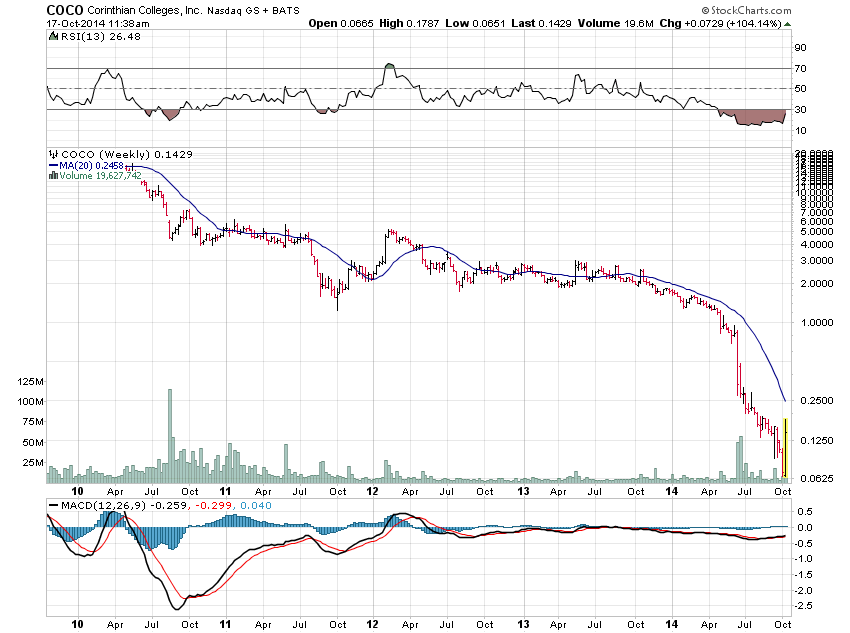“The only thing to do when a person is wrong is to be right, by ceasing to be wrong. Cut your losses quickly, without hesitation. Don’t waste time.” -Jesse Livermore
This morning I closed out the worst trade of my life. Corinthian Colleges stock price is up about 100% this week on news that its creditors aren’t going to immediately force them into bankruptcy. But that doesn’t even come close to making up for the losses I’ve suffered over the past three years.
It began back in 2011 when I first started buying the stock. At the time, it looked cheap because the for-profit industry was facing two major challenges that hurt Corinthian even more than most of its competitors. First, the industry was heading into what appeared to me to be a cyclical downturn as the economy began to improve and those who were out of work became less interested in learning new skills or burnishing their resumes. Second, the federal government was unhappy with the industry’s business practices and started devising and implementing more regulatory restraints for the companies.
What I totally miscalculated was that it’s probably a secular decline, not a cyclical one, for the industry. AND the government was fully prepared to put a company like Corinthian out of business. To make things worse, the stock price tried to tell me this for three years and I just wouldn’t listen.
“The inability to read a tape and spot trends is also why so many in the relative-value space who rely solely on fundamentals have been annihilated in the past decade.” -Paul Tudor Jones
Guilty as charged, Paul. What I’ve learned – the hard way – from all of this: What the best traders and investors in the world perhaps do best is admit when they’re wrong and take a loss quickly.
Warren Buffett’s recent Tesco trade is a great example of this. A few weeks ago it was revealed that the company, the largest grocery store operator in the UK, is now being investigated for accounting fraud. Buffett began dumping his shares almost immediately, roughly a quarter-million of them, in fact, calling the investment a, “huge mistake.”
Buffett’s speed and decisiveness in cutting this loss should be an inspiration to investors. In fact, I believe that even if you don’t have the greatest possible investment or trading process to begin with (just a decent one), if you have a terrific plan for selling that involves cutting losses quickly and ruthlessly, you can generate alpha (outperformance) solely that way (by losing less when markets fall). That’s how critical it is.
Moreover, it doesn’t need to be based solely on fundamental developments as Buffett’s sale seems to be. The trend in Corinthian over the past three years was plain as day. In fact, while I owned it, it rarely spent any time at all above its 200-day moving average. Outside of late 2011, early 2012 it didn’t really ever make any higher highs and higher lows. The trend over the past two years was almost screaming, “this stock is a loser! Get out while you can!!”
The bottom line is this: We all will make mistakes in the markets. What separates the best from the rest is how they deal with them and then how they learn from them and adapt their methods going forward. This was the worst trade of my life. I’ll never forget it because, although it had to literally beat me over the head, this lesson has now been lodged firmly in my brain.
So if you learn anything at all from Jesse Livermore, Paul Tudor Jones, Warren Buffett or from my painful mistake, I hope it’s this: Recognize when you’ve made a mistake and sell immediately. And pay attention to the trend. If it doesn’t validate your thesis, move on to your next idea.
“There is no better test of a man’s integrity than his behavior when he is wrong.” ―Marvin Williams
